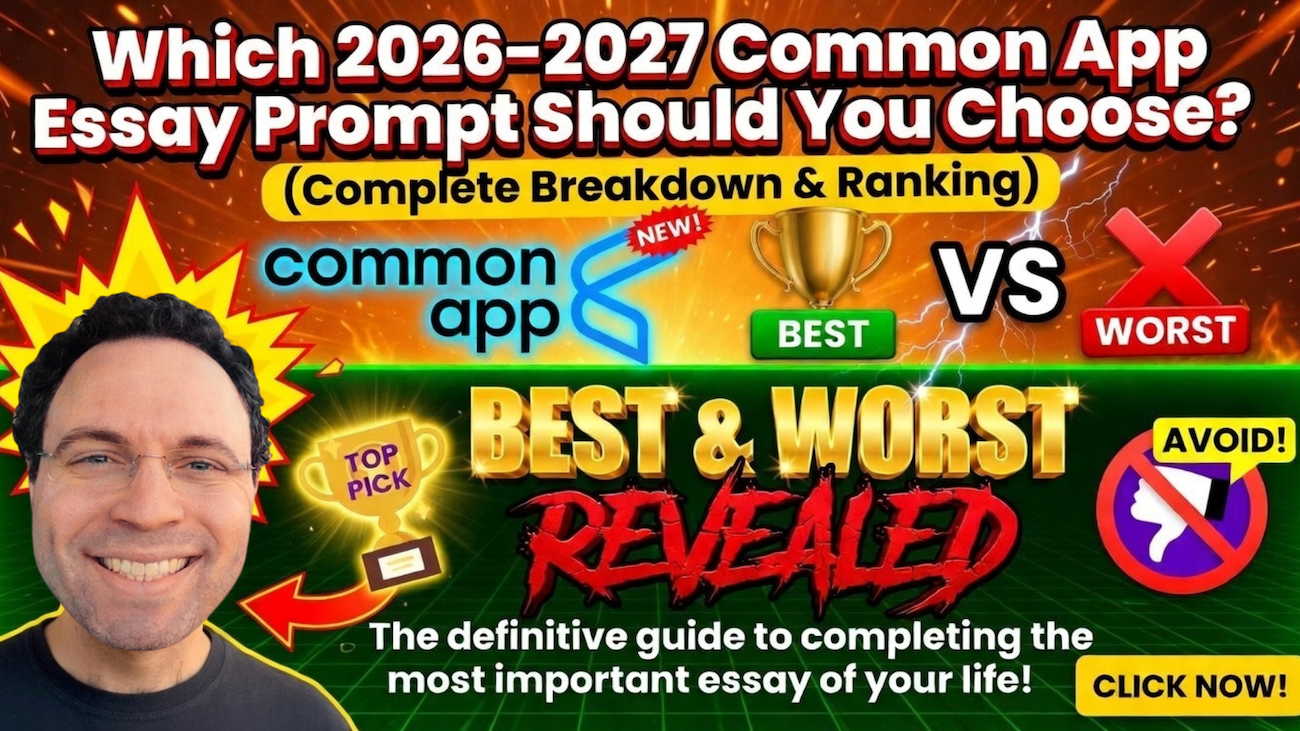 The 2026-2027 Common App essay prompts have been confirmed, so if you are in the high school Class of 2027, what are you waiting for? Now is the time to start drafting your Common App essay.
The 2026-2027 Common App essay prompts have been confirmed, so if you are in the high school Class of 2027, what are you waiting for? Now is the time to start drafting your Common App essay.
With that in mind, did you know that some of the 2026-2027 Common App essay prompts will bring you down like quicksand while others give you the exact structure and framing that you need to show and tell a story that colleges will love?
Before watching my in depth video revealing the best and worst Common App essay prompts, it’s important that you know the seven prompts first-year college applicants have to choose from during the 2026-2027 admissions cycle in order to write one strong Common App essay of up to 650-words. The seven prompt options are:
- Some students have a background, identity, interest, or talent that is so meaningful they believe their application would be incomplete without it. If this sounds like you, then please share your story.
- The lessons we take from obstacles we encounter can be fundamental to later success. Recount a time when you faced a challenge, setback, or failure. How did it affect you, and what did you learn from the experience?
- Reflect on a time when you questioned or challenged a belief or idea. What prompted your thinking? What was the outcome?
- Reflect on something that someone has done for you that has made you happy or thankful in a surprising way. How has this gratitude affected or motivated you?
- Discuss an accomplishment, event, or realization that sparked a period of personal growth and a new understanding of yourself or others.
- Describe a topic, idea, or concept you find so engaging that it makes you lose all track of time. Why does it captivate you? What or who do you turn to when you want to learn more?
- Share an essay on any topic of your choice. It can be one you’ve already written, one that responds to a different prompt, or one of your own design.
Overall, to craft a Common App essay that maximizes your chances of impressing admissions officers, I always recommend starting by choosing a topic that reveals something new, authentic, and unique about you. The essay prompts are ultimately designed to let you show and tell a story only you can show and tell. Reflect deeply on moments that shaped your values, perspective, or growth, whether it’s a small, personal experience (like a conversation that changed your outlook) or a larger challenge (like overcoming a setback). Avoid generic themes like sports victories or mission trips unless you can frame them in a way that’s deeply personal and unexpected. Admissions officers read thousands of essays, so specificity (vivid details, emotions, and insights) sets you apart. For example, instead of writing about “leadership,” describe the moment you hesitated before speaking up in a group and what pushing past that fear taught you.
Once you’ve picked a story, focus on showing rather than telling for at least half the essay. Use sensory details and dialogue to pull readers into the scene, letting your personality shine through your voice. If you’re writing about, say, a family tradition, don’t just say it was meaningful; describe the smell of the food, the sound of laughter, or the awkward silence when someone brought up a tough topic. This paints a picture that feels alive and lets your character emerge naturally. Avoid overloading the essay with objective achievements (especially if you shared details about them elsewhere in your app); your activities list already covers those. Instead, use the essay to reveal what drives you, what you wrestle with, or how you’ve evolved. Admissions officers want to see self-awareness, not perfection, so don’t shy away from vulnerability if it’s honest – like admitting you didn’t have all the answers in a tough moment.
 Structure matters too, but it doesn’t need to be rigid. A strong essay often follows a clear arc: set the scene, explore the experience, and reflect on its impact. Spend the first forty percent drawing readers in with a compelling hook and context, the next twenty to forty percent diving into the heart of the story, and the final twenty to forty percent connecting it to your broader perspective or lessons learned. Reflection is key; admissions officers look for evidence you’ve grown or learned something meaningful. For instance, if you write about failing at a project, don’t end with “I worked harder next time;” instead, dig into how that failure reshaped your approach to collaboration or risk. Keep it concise! Every sentence should earn its place. Aim for 625 words minimum.
Structure matters too, but it doesn’t need to be rigid. A strong essay often follows a clear arc: set the scene, explore the experience, and reflect on its impact. Spend the first forty percent drawing readers in with a compelling hook and context, the next twenty to forty percent diving into the heart of the story, and the final twenty to forty percent connecting it to your broader perspective or lessons learned. Reflection is key; admissions officers look for evidence you’ve grown or learned something meaningful. For instance, if you write about failing at a project, don’t end with “I worked harder next time;” instead, dig into how that failure reshaped your approach to collaboration or risk. Keep it concise! Every sentence should earn its place. Aim for 625 words minimum.
Resist the urge to write what you think colleges want to read. Admissions officers can spot inauthenticity a mile away, so don’t force a “perfect” narrative or mimic sample essays. Write in your own voice, whether it’s witty, introspective, or straightforward. Let your essay sound like you. Get feedback, but not too much; one or two trusted readers (a teacher, counselor, or mentor) can help refine clarity and impact without diluting your style. Revise multiple drafts to polish phrasing and flow, reading aloud to catch awkward spots. If you’re stuck, free write or engage in a fire writing exercise without judgment to uncover what matters most to you. The goal isn’t to dazzle with big words or drama but to leave officers feeling like they know you—and want you in their community.
I also recommend aligning your essay with the rest of your application without repeating it. If your activities list screams “robotics nerd,” your essay could explore a quieter side, like your love for teaching younger kids to code. This adds depth, showing you’re multidimensional. Check each college’s supplemental essays too; some schools ask for similar prompts, so ensure your Common App essay doesn’t overlap too much. Proofread obsessively for typos. A great essay won’t overcome weak grades or test scores, but it can tip the scales by making you memorable. Write something you’re proud of, something that captures who you are right now, and remember this is your chance to speak directly to the people deciding your future.
In the below thirty-minute in-depth video I grade and rank each of the seven Common App essay prompts in order to help you determine which will give you the best chance of positively differentiating your Common App and thus giving you the best chance to get into the colleges on your list.
Sit back, relax (though be ready to take notes), and enjoy this insider’s guide tackling the most important essay assignment of your life so far!
I’m also happy that Common App shared updated statistics regarding the relative popularity of different Common App essay prompts among first-year applicants:
- Topic of your choice: 28%
- Facing adversity: 23%
- Personal growth: 20%
- Background, identify, interest, or talent: 18%
- Intellectual curiosity: 5%
- Gratitude: 3%
- Challenging an idea: 3%
This means that a whopping 28% of first-year applicants wrote an essay on a topic of their choice(!). Watch the video above to learn why I believe that is nothing short of a travesty!
For more expert guidance as you complete your Common App essay, make sure to read or watch the articles/videos linked below.
The Stats You Need: Most Popular & Least Popular Common App Essay Prompts
Common App Essay: Size Does Matter
Why Your College Application Essay is So Bad
Why Your College Application Essay is Awful
Ultimate College Application Essay Brainstorm
Secret to a Successful College Application Essay First Draft
Mind the gaps on your Common App essay!
Meanwhile, though the essay causes students the most consternation, many strong college applicants make far too many silly mistakes on other parts of the Common App. That’s why I’ve recently released my newest course, 17 Silly Mistakes That Even Ivy League Applicants Make on the Common App. I strongly encourage you to purchase it if you want to do all you can to get into the colleges on your list.
Finally, when you’ve finished your Common App and want to know if it’s as strong as possible and whether or not, in its current condition, your chances of admission are impressive, inconclusive, or inadequate, you’d be wise to get My Pre-Read to be sure what you are about to submit will give you the best chance to get in.
Good luck!

 University of Southern California is making three major changes that should really shake up its admissions profile for its Class of 2031 (the high school class of 2027) and beyond.
University of Southern California is making three major changes that should really shake up its admissions profile for its Class of 2031 (the high school class of 2027) and beyond. The 2025-2026 college admissions process is almost upon us. This means it’s an important time for members of the high school Class of 2026 – especially those who want to run the gauntlet this admissions cycle – to be aware of the the five colleges with the most grueling standardized test requirements for first-year admission.
The 2025-2026 college admissions process is almost upon us. This means it’s an important time for members of the high school Class of 2026 – especially those who want to run the gauntlet this admissions cycle – to be aware of the the five colleges with the most grueling standardized test requirements for first-year admission.

 What does a decade’s worth of increasingly identity-based admissions look like at University of Wisconsin-Madison? You’re about to find out. But formal Affirmative Action, which was outlawed by The Supreme Court of the United States last year, is just part of the story.
What does a decade’s worth of increasingly identity-based admissions look like at University of Wisconsin-Madison? You’re about to find out. But formal Affirmative Action, which was outlawed by The Supreme Court of the United States last year, is just part of the story. It’s October, so it means that many high school seniors are spending a lot of time completing their college applications before all-important early deadlines. While this can be stressful enough when one is applying to only colleges on the Common App, it can become downright painful when having to complete extra requirements beyond the standard Common App that certain colleges and universities are now expecting of college applicants. In particular, completing the SRAR (Self-Reported Academic Record), SSAR (Self-Reported Student Academic Record), or the Courses & Grades section of the Common App can be a source of major annoyance for high school seniors applying to college for several reasons.
It’s October, so it means that many high school seniors are spending a lot of time completing their college applications before all-important early deadlines. While this can be stressful enough when one is applying to only colleges on the Common App, it can become downright painful when having to complete extra requirements beyond the standard Common App that certain colleges and universities are now expecting of college applicants. In particular, completing the SRAR (Self-Reported Academic Record), SSAR (Self-Reported Student Academic Record), or the Courses & Grades section of the Common App can be a source of major annoyance for high school seniors applying to college for several reasons. When it comes to college admissions, your GPA is a major determinant of your potential options. Understanding where your GPA places you can help narrow down your college choices and ensure you’re applying to institutions that align with your academic profile. In this guide, we’ll explore how to find the best colleges that accept your GPA and provide a list of schools for each GPA range, from 3.3 to 3.8.
When it comes to college admissions, your GPA is a major determinant of your potential options. Understanding where your GPA places you can help narrow down your college choices and ensure you’re applying to institutions that align with your academic profile. In this guide, we’ll explore how to find the best colleges that accept your GPA and provide a list of schools for each GPA range, from 3.3 to 3.8. Colleges That Accept a 3.6 GPA
Colleges That Accept a 3.6 GPA